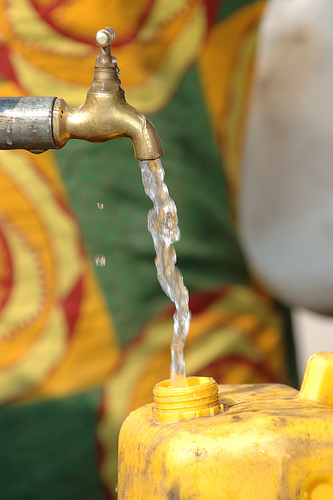African bloggers are highlighting water related issues, from the politics in South Africa that led to suspension of a water quality expert, new devices for collecting and cleaning water, to the ‘scramble for fish’ the East African lake region.
 [1]
[1]
CC licenced photo by Julien Harneis [2] on flickr.
We start with South Africa where the blog Urbansprout highlights the suspension Dr. Anthony Turton [3] . Dr Turton is a researcher who was set to deliver a presentation at the conference “Science Real and Relevant” in Pretoria. He was barred from delivering the presentation, and later suspended by The Council for Scientific and Industrial Research (CSIR).
The blogger includes the presumed reason for his suspension as communicated by the CSIR, but also looks at the content of Dr. Turton's paper [4][pdf on environment.co.za], noting…
Taking a brief look at Dr Turton's paper, he argues that a lack of investment in science, engineering and technology (SET) since the early 1990's, the termination of important research projects and the shift to a contract driven income model has had a “catastrophic effect” on our national scientific capacity to deal with the technical challenges our water quality is facing.
There is also the question of academic freedom of scientists to present their findings. Urbansprout quotes a science journalist reacting to news of Dr. Turton's suspension.
Science journalist and former Journalism head of department of the University of Stellenbosch, Dr George Claassen asserted that the withdrawal of the presentation by the CSIR was an “absolute disgrace”. “This is a very serious encroachment on academic freedom and the right of scientists to announce their results, no matter how bad those results are for our view of things,” he commented. Claassen noted that academic and research freedom was protected under Section 16 of the constitution, which states that everyone has the right to freedom of expression, including academic freedom and freedom of scientific research.
Urbansprout provides the link for an online petition in support of Dr. Turton [5] and concludes:
Turton's report highlighted that South Africa could be headed for a water supply and water quality crisis that could negatively impact on the economic growth and development of the country, as well as lead to social unrest. The findings conflicted starkly with recent government assurances that South Africa was not facing a water crisis similar to the one prevailing in the electricity-supply sector.
A previous post on Urbansprout [6] gives more information about the water crisis in South Africa, which is characterized by sewage seeping from municipal treatment works to rivers. The water from the rivers feeds into the local tap water system.
A WaterMill [7] is described on the BLDG blog as a device that “uses the electricity of about three light bulbs to condense moisture from the air and purify it into clean drinking water.” Rory of The Carbon Smart blog [8] links to the BLDG post [9], and considers ‘micro devices’ like the WaterMill, and whether this could be a source of clean drinking water for urban areas. He writes:
Discussion about the WaterMill [9] — a small-scale dehumidifier that collects and cleans water from the air — leads to conjecture not only about how much of our drinking water could come from the air, but also about whether the urban microclimate could be significantly altered by installing thousands of these low-energy devices. Could we do away with a significant number of energy-sapping air conditioners by making our environment more comfortable through a combination of better building design, appropriate clothing, vegetating the landscape and reducing the ambient humidity with thousands of WaterMills?
In East Africa, the Kenyan blog Kenvironews highlights [10] a piece by Namhla Matshanda of the African Security Analysis Programme. The piece looks at the conflict over Migingo island in Lake Victoria [11], which is claimed by both Uganda and Kenya. The piece warns:
The so-called ‘scramble for fish’ in Lake Victoria is turning out to be a source of conflict between nations bordering the lake and could potentially threaten regional stability. In the past month alone there have been several incidents around the lake that have heightened tensions between Uganda, Tanzania and Kenya. It is now apparent that the main source of these incidents is the lack of a clearly delimited and demarcated border between the three countries sharing Lake Victoria.
Since 2003, a number of Kenyan fishermen have been arrested and their boats and equipment confiscated by either Tanzanian or Ugandan authorities for “illegally crossing the common borders.” The latest incident happened when about 400 Kenyan fishermen were kicked out of Migingo island by Ugandan authorities. Migingo is claimed by both Uganda and Kenya. This incident has exacerbated the already strained relations between the two countries. The Kenyan fishermen have appealed to their political leaders to intervene, some even threatening violence.